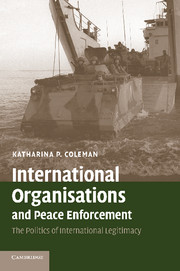Book contents
- Frontmatter
- Contents
- List of maps
- List of figures
- List of tables
- Acknowledgements
- List of abbreviations
- 1 Introduction
- 2 States, international organisations, and legitimacy: a theoretical framework
- 3 Peace enforcement through sub-regional organisations: the Economic Community of West African States and Operation Liberty in Liberia
- 4 Peace enforcement through sub-regional organisations: the Southern African Development Community and Operation Sovereign Legitimacy in the Democratic Republic of Congo
- 5 Peace enforcement through sub-regional organisations: the Southern African Development Community and Operation Boleas in Lesotho
- 6 Peace enforcement through a military alliance: the North Atlantic Treaty Organisation and Operation Allied Force in Kosovo
- 7 Peace enforcement through a global organisation: the United Nations and INTERFET in East Timor
- 8 Conclusion
- Epilogue: UN intervention in Lebanon
- Appendix: Summary of interviews conducted
- Bibliography
- Index
6 - Peace enforcement through a military alliance: the North Atlantic Treaty Organisation and Operation Allied Force in Kosovo
Published online by Cambridge University Press: 10 November 2010
- Frontmatter
- Contents
- List of maps
- List of figures
- List of tables
- Acknowledgements
- List of abbreviations
- 1 Introduction
- 2 States, international organisations, and legitimacy: a theoretical framework
- 3 Peace enforcement through sub-regional organisations: the Economic Community of West African States and Operation Liberty in Liberia
- 4 Peace enforcement through sub-regional organisations: the Southern African Development Community and Operation Sovereign Legitimacy in the Democratic Republic of Congo
- 5 Peace enforcement through sub-regional organisations: the Southern African Development Community and Operation Boleas in Lesotho
- 6 Peace enforcement through a military alliance: the North Atlantic Treaty Organisation and Operation Allied Force in Kosovo
- 7 Peace enforcement through a global organisation: the United Nations and INTERFET in East Timor
- 8 Conclusion
- Epilogue: UN intervention in Lebanon
- Appendix: Summary of interviews conducted
- Bibliography
- Index
Summary
At 8 p.m. local time on 24 March 1999, almost 400 aircraft attacked the Federal Republic of Yugoslavia. Simultaneously, Tomahawk Tactical Land Attack Missiles were launched into Yugoslavia from several warships. Eight member states of the North Atlantic Treaty Organisation (NATO) contributed to this combined, synchronised attack, in which over forty different Yugoslav targets were hit. This was the opening blow in NATO's military campaign over Kosovo, codenamed Operation Allied Force. In the course of the 78-day campaign, thirteen NATO countries deployed over 1,000 aircraft and flew 38,400 sorties, including 10,484 strike sorties that released 26,614 air munitions over the Federal Republic of Yugoslavia (FRY).
This chapter explores why the USA, which led and dominated Operation Allied Force, chose to launch the intervention within a NATO framework. After a brief historical background to the intervention, it demonstrates that neither international law nor burden-sharing concerns explain this decision. By contrast, concerns about the international legitimacy of the intervention played a major role in persuading the USA to accept the considerable costs and inconveniences associated with the NATO framework.
Historical background
Operation Allied Force sought to end government-sponsored repression in Kosovo. The region's predominantly ethnic Albanian population had been increasingly discriminated against since the revocation of its status as an autonomous province of Serbia in July 1990. After initial attempts at non-violent resistance, an armed resistance movement, the Kosovo Liberation Army (KLA), emerged in the mid-1990s.
- Type
- Chapter
- Information
- International Organisations and Peace EnforcementThe Politics of International Legitimacy, pp. 194 - 239Publisher: Cambridge University PressPrint publication year: 2007



